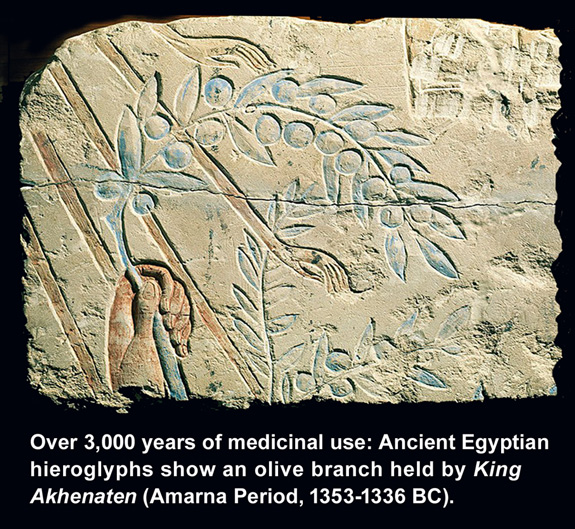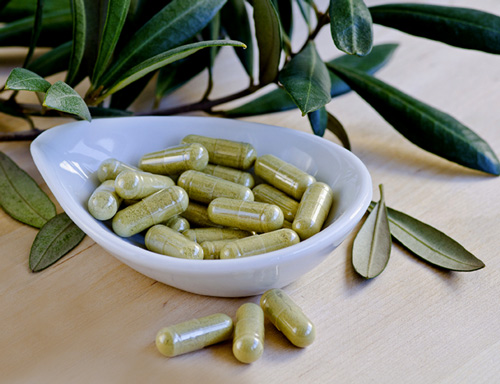Leaves from the olive tree (Olea europaea) have been used as a medicinal for thousands of years, and represents one of the world’s oldest continuously-used medicinals.
While most people recognize that the olive fruit—along with oil made from the fruit—have been used for millennia, most people don’t know that the leaves have provided medicinal benefits to the populations of the Mediterranean area for equally long periods.
Olive leaves were used widely by the Greek civilization well over 2,000 years ago. Meanwhile, archealogical records suggest an even more ancient history in the Egyptian civilization—with records of use some 3,500 years ago.
Olive leaf as medicine is also referenced in the book of Ezekiel in the Bible, written in the 6th century BC: “The fruit thereof shall be for meat, and the leaf thereof for medicine.” (Ezekiel 47:12)
Traditional Uses
Historical records show olive leaf was prepared as infusions or poultices to apply to the skin for wounds and skin conditions. It was also consume internally to relieve symptoms of digestive issues and general illness.
Olive leaves appear to have been used prolifically to combat infections since the antibacterial and antiviral properties of olive leaves were well-recognized. While the scientific studies that are available today did not exist, the traditional use was based on empirical evidence and the historical experience of the local people in the Mediterranean area
The first report of the medicinal use of olive leaves in modern times was in 1843 when Daniel Hanberry of England reported that a bitter substance from olive leaf tea was effective for treating malaria and related fevers. These findings were reported in 1854 in the Pharmaceutical Journal, along with dosing instructions and a prescription for making therapeutic tea. In 1898, a powerful decoction of olive leaves was reported to King’s American Dispensatory as helpful in regulating body temperature.
While medicinal use of olive leaf has been discouraged in the West in favor of pharmaceuticals, according to botanist James A. Duke, Iranians use an olive leaf decoction to cure coughs, while in Algeria, olive leaves are chewed to relieve toothaches.
In “nutritional supplement” form the potent constituents fround in olive leaves are extracted and are available in capsules, tinctures and teas. Olive leaf extracts are also used in lotions or ointments for skin application.
While extracts in ancient times would have been obtained with simple boiling techniques, today extraction processes are considerably more complicated and typically require solvents to obtain the vital isolated nutrients.
Modern research has unveiled numerous benefits of olive leaf extract, with the active compound oleuropein perhaps receiving the most attention.
Oleuropein is a potent antioxidant that has been studied for bolstering the immune system, supporting cardiovascular health, and reducing inflammation. Studies also indicate that it is effective in in combating oxidative stress, which contributes to longevity and vitality.
Other bioactive compounds found in olive leaf include oleacein, tyrosol and hydroxytyrosol.
As the studies accumulate olive leaf has re-emerged as a formidable ally in promoting health. The science-backed evidence suggests support for protecting the brain against Alzheimer’s and Parkinson’s; for lowering blood pressure; treating type 2 diabetes; supporting weight management; and reducing the risk of cancer.
Latest study
A new meta-analysis conducted in Portugal adds to the existing evidence that olive leaf extract supports healthy blood pressure.
The systematic review, published in Phytotherapy Research in May 2025, evaluated three studies that met the strict scientific qualifications. The three studies included a total of 248 participants, all of whom were hypertensive or pre-hypertensive.
According to the findings of the study a one-gram daily dose of olive leaf extract reduced systolic blood pressure by 11.45 mmHg and diastolic blood pressure by 4.65 mmHg.
The researchers noted that the bioactive compounds in olive leaf appear to “inhibit angiotensin and promote an antihypertensive effect.”
The researchers also noted that the blood pressure improvements are no small matter. In fact, other studies have shown that even a 10 mmHg reduction in systolic blood pressure is associated with a 20% reduction in major cardiovascular events—so the improvement observed in the current study is considerable.
“These findings emphasize the use of herbal medicines, since each decrease of 10 mmHg in Systolic Blood Pressure and 5–6 mmHg in Diastolic Blood Pressure substantially reduces the risk of cardiovascular disease,” the researchers wrote in the study summary.
– –
Olive leaf extract can be found in Optimal Defense from Optimal Health Systems.
Olive leaf powder is part of the potent Neuro Enhancement blend found in Opti-Brain.
– –
Sources: Phytotherapy Research, JustAPedia.org (olive).



